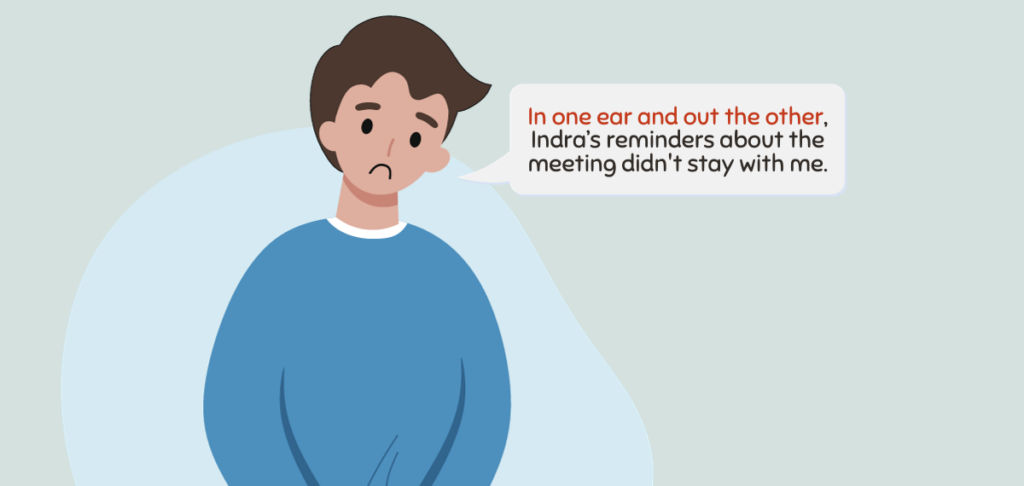Go in one ear and out the other means someone is being forgetful or not paying attention, even after being told to do something. This expression is an idiom, a figurative phrase with no literal meanings attached to the words within it. Idioms are essential to the English language because they give us even more ways to communicate in ways that anyone can relate to.
To use an idiom correctly, you have to consider the context around it. Understanding its meaning and origin can really help. This article overviews this idiom’s literal and figurative meanings and its ancient origin and even shares a few sentence examples pulled from literature and media that show how to use it correctly.
Keep reading to uncover the idiom go in one ear and out the other.

What Does the Idiom ‘In One Ear and Out the Other’ Mean?
The idiom in one ear and out the other means that someone doesn’t remember or pay attention to the information they hear. It is used in everyday language to express forgetfulness or lack of attention. An example of its use would be, “I told him to do his chores, but it seems to have gone in one ear and out the other.”
Literal Interpretation
When you first hear it, the phrase in one ear and out the other might seem like it’s discussing the mechanics of hearing. But it’s not about acoustics at all. It just points out how someone could be speaking, but the other person is definitely not listening or not paying attention.
Idioms are meant to be figurative, but in a more literal sense, the Collins Dictionary says if a piece of information goes in one ear and out the other, and you pay no attention to it or forget about it immediately, then the information literally went into one ear and exited the other side without being retained.
Figurative Interpretation
At its core, in one ear and out the other is a phrase that refers to someone not retaining information, suggesting inattentiveness or distraction.
The Cambridge Dictionary states if you say that something you hear goes in one ear and out the other, you mean you quickly forget it.
The more figurative definition from the Collins Dictionary is: If you say something goes in one ear and out the other, you mean that someone pays no attention to it or forgets about it immediately.
Is ‘in One Ear and Out the Other’ an Impolite or Offensive Phrase to Use?
Generally, no. But context matters! In some situations, saying it could imply that the listener is dismissive or uninterested, which might not be taken too kindly. Saying it about yourself, however, is like self-deprecating humor.
What Is the Origin of the Idiom ‘in One Ear and Out the Other’?

The phrase derives from the 14th century to mean nothing said is retained or remembered. But its idiomatic form really took off during the late 1600s.
Earliest Mentions
Chaucer himself used it in Troilus and Criseyde in the 1300s. It also appeared early in John Heywood’s proverbs during the 1500s. But the idea is also connected to the Roman orator Quintilian, who worked in the first century C.E. and said: “The things he says flow right through the ears.”
Evolution Over Time
The core meaning has remained the same, but cultural contexts and applications have made it a versatile idiom in modern lingo. Even though it went from nothing said is retained or remembered to in one ear and out the other, the intent behind it has always remained the same.
When and How Is the Phrase ‘in One Ear and Out the Other’ Used?
The phrase in one ear and out the other is an idiomatic expression commonly used to describe a situation where someone isn’t retaining or paying attention to the information they are being told. The phrase suggests that the words enter one ear but don’t stick in the person’s mind and simply exit out of the other ear.
Like most phrases in the English language, there’s a time and place to use them, and in one ear and out the other has several ways to be used.
Everyday Speech
From classrooms to boardrooms, if someone’s missed a point, this idiom might make an appearance. Here are a few examples of how and when to insert the phrase.
- If you’re giving someone verbal instructions and they’re clearly not listening, you could say, “Is this just going in one ear and out the other?” This could be in the classroom, at work, or even at home.
- Or when someone is talking to you, but you can’t remember what they said, you could reply with, “I’m so sorry. That just went in one ear and came out the other.”
Literature and Media
Aside from different versions appearing in the works of Shakespeare and Chaucer, the common phrase has been used in media all over.
The conversations were nice and suggestive at first, Ben said, but he realized it was going in one ear and out the other for his active parents. (The Owensboro Times)
“Emily was always so good about letting it go in one ear and out the other, not ever saying anything. … It’s got to be hard on a child-player who also has their dad as a coach.” (The Chronicle Tribune)
But Connie’s words go in one ear and out the other as Charlie discharges himself – without Connie’s knowledge – and goes to the local pub to continue boozing. (The Sun)
Peter (the adorable Yashua Mack), clad in a dirty red school blazer, encourages his new recruits to let worries go in one ear and out the other, because he’s seen others fall to adult pressures. (The New York Post)
What Are Common Misconceptions, Misuses, and Misinterpretations About This Idiom?
- It’s about sound mechanics.
- It’s a polite way to indicate listening. (Hint: It isn’t.)
- It’s a modern phrase. (Thanks, Heywood.)
What Are Related Words, Terms, and Phrases?
Synonyms and antonyms make a word or phrase more rounded, giving you a better understanding of its meaning and some options to work with. Here are a few:
Similar Words
- Ignoring
- Overlooking
- Neglecting
- Disregarding
- Unheeded
- Unretained
Antonyms
- Paying heed to
- Keeping it in mind
- Paying close attention to
- Taking into account
- Taking on board
- Absorbing information like a sponge
- Taking it to heart
- Hanging on every word
- Taking note of
Similar Phrases and Idioms
- Over one’s head
- Turn a deaf ear
- It went south
- Falling on deaf ears
- Forgotten immediately
- Slipping one’s mind
- Turned a blind eye to
- Like water off a duck’s back
- Like flogging a dead horse
- Like talking to the hand
- Like preaching to the choir
- Speaking to the wind
- Talking to the air
- Whistling in the wind
How Should ‘in One Ear and Out the Other’ Be Structured Grammatically?
This idiom is meant to be used as an adverbial phrase to suggest how an action was performed.

Here are several ways you might structure this idiom grammatically within different sentences:
- At the beginning of a sentence:
- In one ear and out the other, Indra’s reminders about the meeting didn’t stay with me.
- In the middle of a sentence:
- The instructions I gave Emori, in one ear and out the other as they seemed to be, resulted in the project being done incorrectly.
- At the end of a sentence:
- I explained the procedure to Murphy twice, but it seems to have gone in one ear and out the other.
- As part of a compound sentence:
- I tell Clarke every day to clean her room, but it’s in one ear and out the other; she never remembers to do it.
Remember that when using this idiom, it’s crucial that the context involves communication that was either ignored, forgotten, or not understood to convey the phrase’s full meaning.
Listen Carefully
In dissecting the idiom in one ear and out the other, we’ve studied its meaning, origins, and practical applications. This idiom, denoting forgetfulness or lack of attention, enriches communication by adding flavor to the English language.
Understanding idioms aids in effective use and enhances communication. Upon encountering this idiom, we’re now better equipped to appreciate its context and utility. Be sure to grab a few more idiomatic expressions from our site, too!
Check out some others we covered:
